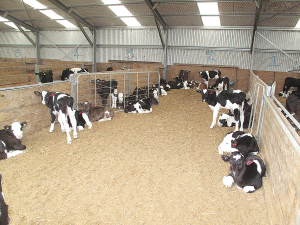DairyNZ Calls for Changes to Government’s Proposed Resource Management Act Reform
DairyNZ says the Government’s proposed Resource Management Act reform needs further work to ensure it delivers on its intent.
 Young calves should be housed for at least 4 weeks to ensure they stay warm and are using their energy for growth.
Young calves should be housed for at least 4 weeks to ensure they stay warm and are using their energy for growth.
Rearing facilities should be set-up and maintained well to ensure calves stay healthy.
Young calves should be housed for at least four weeks to ensure they stay warm and are using their energy for growth.
Housing
Spacing Calves
Feeding Facilities
Cleaning
Article: NZAgbiz
Budou are being picked now in Bridge Pā, the most intense and exciting time of the year for the Greencollar team – and the harvest of the finest eating grapes is weeks earlier than expected.
The Real Estate Institute of New Zealand (REINZ) has released its latest rural property report, providing a detailed view of New Zealand’s rural real estate market for the 12 months ending December 2025.
Rural retailer Farmlands has released it's latest round of half-year results, labeling it as evidence that its five-year strategy is delivering on financial performance and better value for members.
OPINION: "We are back to where we were a year ago," according to a leading banking analyst in the UK, referring to US president Donald Trump's latest imposition of a global 10% tariff on all exports into the US.
DairyNZ says the Government’s proposed Resource Management Act reform needs further work to ensure it delivers on its intent.
Overseas Trade Minister Todd McClay says he's working constructively with the Labour Party in the hope they will endorse the free trade agreement (FTA) with India when the agreement comes before Parliament for ratification.
OPINION: Expect the Indian free trade deal to feature strongly in the election campaign.
OPINION: One of the world's largest ice cream makers, Nestlé, is going cold on the viability of making the dessert.